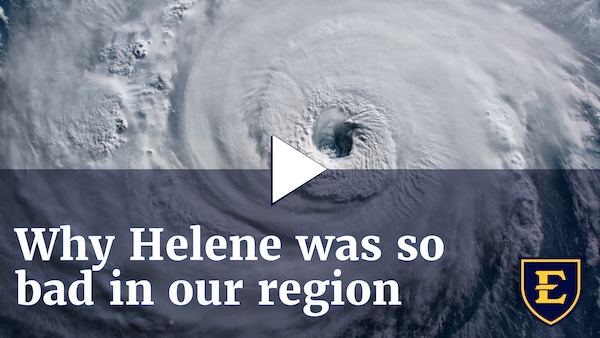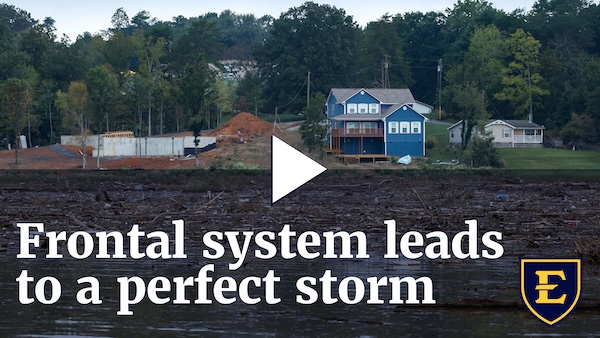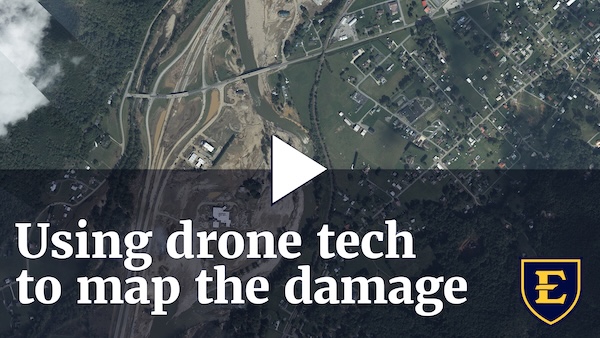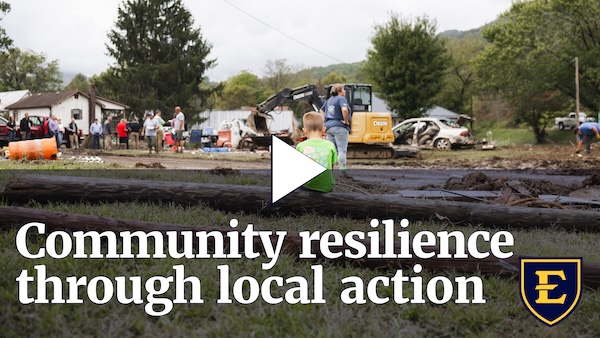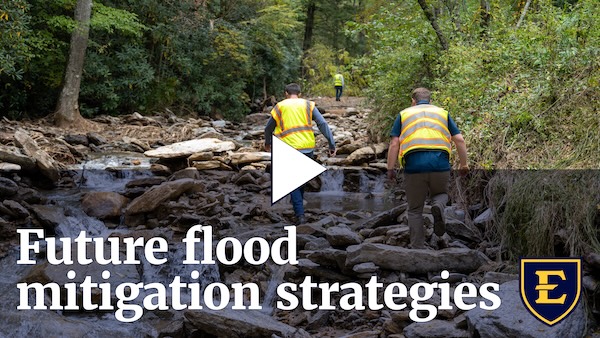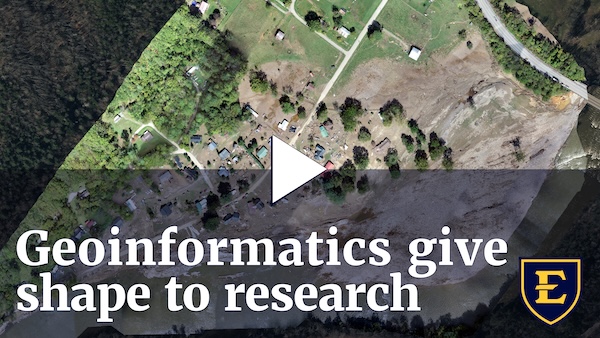On September 27, 2024, Hurricane Helene brought devastation to the Appalachian Mountains.
The Nolichucky River flooded its banks Friday, September 27, as a result of excessive
rains from the remnants of Hurricane Helene — leaving towns and communities scrambling
to seek shelter from swift floodwaters.
Dr. Andrew Joyner, Tennessee’s official climatologist and associate professor at East Tennessee State University, is among those leading efforts to assess catastrophic flood damage caused by Hurricane Helene. On Wednesday, October 2, Dr. Joyner's team used drones to survey farms, communities, and infrastructure in Washington and Greene Counties. Their focus was on the upper and lower sections of the Nolichucky River, where multiple bridges and properties were destroyed by the floodwaters.
This limited series explores the impact of Hurricane Helene on Southern Appalachia, revealing the science, resilience, and community efforts driving recovery and long-term adaptation in an era of extreme weather.
Episode 1: What Happened?
Dr. Joyner breaks down the devastating impact of Hurricane Helene on East Tennessee,
Appalachia, and Western North Carolina and explains how the unique Appalachian Mountains terrain contributed to the worst flooding many have ever seen.
Episode 2: Record Flow Rate
Dr. Joyner explains how Helene pushed the flow rate of the Nolichucky to an unprecedented 84,000 cubic feet per second, over twice that of Niagara Falls. The surge destroyed infrastructure and exposed the limits of flood mitigation in East Tennessee.
Episode 3: A Perfect Storm
Dr. Joyner discusses how Hurricane Helene, combined with a frontal system, created a “perfect storm” that brought unprecedented flooding to East Tennessee and Western North Carolina, dwarfing past flood events.
Episode 4: Drone Technology
Dr. Joyner describes how drone technology captured rapid flood imagery to assist emergency agencies responding to Helene's devastation. This data will improve future flood predictions and helps protect vulnerable communities.
Episode 5: Bucs Rebuild Together
After Hurricane Helene, ETSU’s “Bucs Rebuild Together” initiative organized critical relief efforts that reflected the university mission to improve the lives of the people in the region and beyond.
Episode 6: Adaptation and Long-term Resilience
Dr. Joyner highlights how more communities in the region are at risk of flooding and other hazards than previously thought. The Community Resilience Academy, launching in 2025, which will help local leaders improve long-term disaster preparedness.
Episode 7: Hazard Mitigation Planning
Dr. Joyner explores how ETSU’s Tennessee Climate Office and Geoinformatics and Disaster Science Lab are advancing climate resilience and hazard mitigation across Tennessee through flood modeling, risk assessment, and state collaboration.
Episode 8: Geoinformatics
Dr. Joyner shares innovative work transforming disaster resilience across Appalachia. From creating tools like the Enhanced Priority Risk Index to addressing challenges like Hurricane Helene, climatologists are building stronger, more prepared communities.
Episode 9: Hope After Hurricane Helene
Dr. Joyner reflects on the resilience of East Tennessee and Western North Carolina communities following Hurricane Helene, highlighting their collaborative response to the disaster. These survivors continue to support one another, offering hope for a strong recovery.
Subscribe to ETSU's YouTube Channel to Discover More Incredible Research.
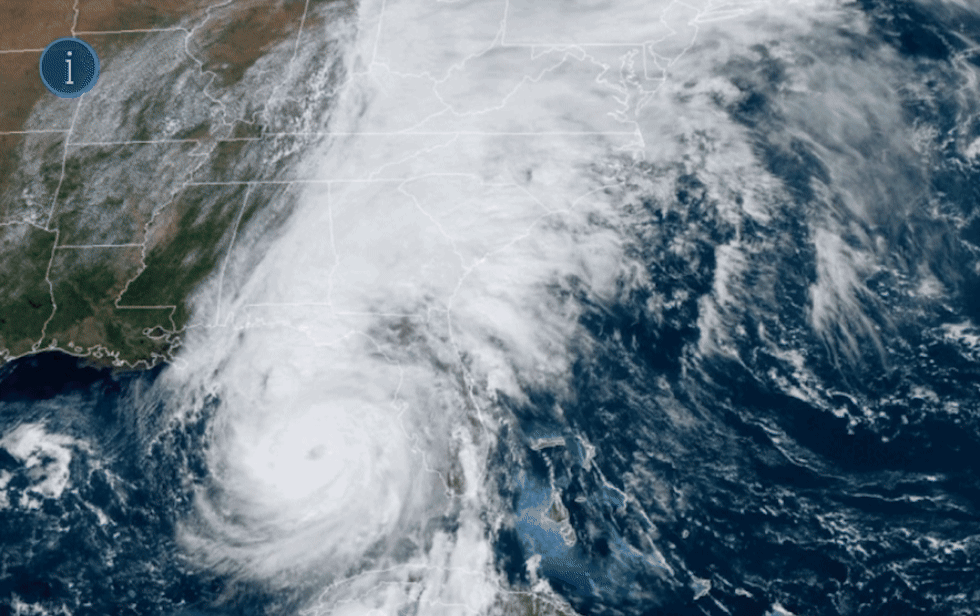
An In-Depth Look at Helene's Impact
Learn more about Hurricane Helene’s devastating impact on Northeast Tennessee and the surrounding region by exploring this detailed report from the Tennessee Climate Office.

Bucs Rebuild Together:
ETSU's Response to Hurricane Helene
Since its inception in 1911, ETSU has been committed to improving the quality of life for the people of the region and beyond. Central to this mission is the belief that people come first.
Bucs Rebuild Together, the university’s response to the devastation from Hurricane Helene in the region, reflects ETSU’s continuing commitment to supporting our communities in times of need. Through collaborative efforts, we are dedicated to helping rebuild, embodying our core values of service, excellence and compassion.
In addition to this work, Dr. Joyner directs ETSU’s Geoinformatics & Disaster Science Lab. His leadership has positioned the university at the forefront of climate research and resilience efforts. By collaborating with state and national organizations, his team is working on developing mitigation plans and boosting community preparedness to tackle future disasters through cutting-edge strategies.
Our Special Thanks to the Following Contributors:
ETSU’s Department of Geosciences
WCYB-TV (NBC/Fox)
Tennessee Climate Office
Tennessee Emergency Management Agency (TEMA)
Tennessee Valley Authority (TVA)
Tennessee Department of Transportation (TDOT)
Ballad Health
North Carolina Department of Transportation (NCDOT)
NOAA NWS
Stay in Touch
Follow ETSU on Social
 South Dossett Drive - Closure...
South Dossett Drive - Closure... 